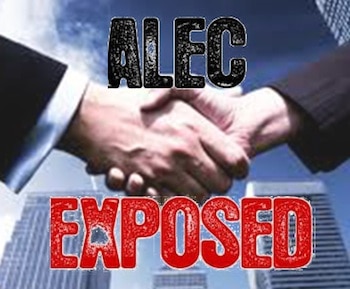The American Legislative Exchange Council (ALEC) has a big year ahead of them, as they attempt to dismantle a slew of environmental protections from state to state. More specifically, the corporate front group is hoping to pass dirty energy friendly legislation to ease the rules for electric utilities.
From state to state, ALEC is drafting legislation that would cut renewable energy, increase dependence on coal and dismantle energy efficiency standards.
ALEC specializes in crafting legislation at the state level and pushing it through legislatures that are often under much less scrutiny than the federal government. This is what has made the group so successful in the past.
Utility Drive has outlined ALEC’s 2014 agenda:
ALEC has seven approved model resolutions and policies related to climate change. One resolution opposes EPA’s endangerment finding for carbon dioxide and any greenhouse gases regulation because of the economic burden they would cause. Another resolution urges a state’s governor to withdraw from a regional climate initiative. And a third resolution opposes so-called carbon taxes.
ALEC has a model resolution for its members that calls on Congress to pass legislation “so that that the benefits of coal-fire-generated electricity to Americans and state economies are increased, not decreased; fuel diversity and grid reliability is improved, not restricted; and continuing emission reduction progress is made while minimizing capital costs, rate increases.”
ALEC opposes mandates requiring utilities to buy renewable energy, and has a model bill – the Electricity Freedom Act – that would eliminate a state’s RPS.
ALEC has another bill – the Market-Power Renewables Act – designed for states that would be unlikely to repeal their RPS.
ALEC’s timing and venue choice are no coincidence. The state-level approach gives the group a much more pliable horde of politicians to work with than they would have if they attempted to pass this legislation on the federal level.
24 states across the country have both a Republican governor and a Republican-controlled state legislature, which means that the chances of enacting anti-environmental legislation are greatly increased. There are many other states with either a Republican-controlled legislature or a Republican governor where ALEC will focus as well.
Republican rule of most of the country is also no coincidence. According to a report by the Progressive Magazine, ALEC is the group that helped swing control of many of these states to the Republican Party, and now they are simply looking for a return on their investment.
Also working in their favor is the fact that states, even those that attempt to implement stronger environmental protections, are often slow to put new laws into effect, have fewer financial resources to enforce the laws and perform compliance inspections, and are less likely to fine companies who break environmental laws.
The lackadaisical approach to environmental review and the overall pliancy of state legislatures helps explain the choice to push legislation on the state level, but the timing is equally as important for ALEC.
Later this year, midterm elections will see governors, state legislators, and a slew of federal lawmakers facing tough reelection battles, and the makeup of governments at every level could easily swing from one party to the other. ALEC certainly has the financial resources to help elect industry-friendly politicians, but their record in the 2012 elections showed that the group is quickly losing power.
Tough economic times — as with the current high rates of unemployment, mortgage foreclosures, and stagnant pay of American workers — have historically spelled disaster for incumbents, making a political shift in government not only possible, but quite likely. This is why ALEC is making their push now, just in case their friends in the political arena find themselves among the ranks of the unemployed this time next year.
While ALEC’s legislation poses a very real threat to both the environment and American citizens, they no longer have the benefit of anonymity.
A few years ago, this legislation could have easily been passed without any form of scrutiny, but with the work of groups like ALEC Exposed, the American public is well aware of ALEC’s corporate agenda. As the 2012 elections showed, they don’t agree with what the group is trying to accomplish.
Subscribe to our newsletter
Stay up to date with DeSmog news and alerts







